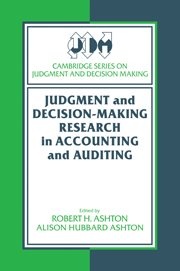Book contents
- Frontmatter
- Contents
- Contributors
- Series Preface
- Preface
- Acknowledgments
- Part I Overview
- Part II Judgment and decision-making research involving users of accounting information
- Part III Judgment and decision-making research involving auditors of accounting information
- 6 Judgment and decision-making research in auditing
- 7 The role of knowledge and memory in audit judgment
- 8 Research in and development of audit-decisions aids
- Part IV Conclusion
- References
- Index
7 - The role of knowledge and memory in audit judgment
Published online by Cambridge University Press: 03 May 2010
- Frontmatter
- Contents
- Contributors
- Series Preface
- Preface
- Acknowledgments
- Part I Overview
- Part II Judgment and decision-making research involving users of accounting information
- Part III Judgment and decision-making research involving auditors of accounting information
- 6 Judgment and decision-making research in auditing
- 7 The role of knowledge and memory in audit judgment
- 8 Research in and development of audit-decisions aids
- Part IV Conclusion
- References
- Index
Summary
Over the past decade, growing interest in the role of knowledge as a determinant of audit judgment performance has developed from three sources. First, observations that experienced auditors are paid more and assigned to what appear to be more demanding and important tasks (e.g., Gibbins, 1984) were not supported by consistent findings of experience–related performance differences (Wright, 1988; Bedard, 1989). This anomaly led to the realization that predicting and understanding the causes of experience effects requires more systematic analysis. In particular, it underscored the need to specify the knowledge necessary to complete different judgment tasks; when, how, and how well the knowledge would normally be acquired; and the cognitive process(es) through which the knowledge would be brought to bear on the decision task (Frederick and Libby, 1986; Abdolmohammadi and Wright, 1987). Second, increasing interest in less–structured audit judgment tasks (e.g., Einhorn, 1976; Kida, 1984; Libby, 1985; Biggs et al., 1988) such as analytical risk assessment, fraud detection, and going–concern judgments, focused attention on the role of the auditor's task–specific knowledge in problem recognition, hypothesis generation, and information search (cf. Libby, 1981,1983; Gibbins, 1984; Waller and Felix, 1984a). Third, while the above studies focused on general knowledge of audit phenomena, other researchers (e.g., Plumlee, 1985; Moeckel and Plumlee, 1989; Frederick, 1991) addressed the fact that memory for evidence gathered during a particular engagement has important implications for decision performance.
- Type
- Chapter
- Information
- Judgment and Decision-Making Research in Accounting and Auditing , pp. 176 - 206Publisher: Cambridge University PressPrint publication year: 1995
- 109
- Cited by

